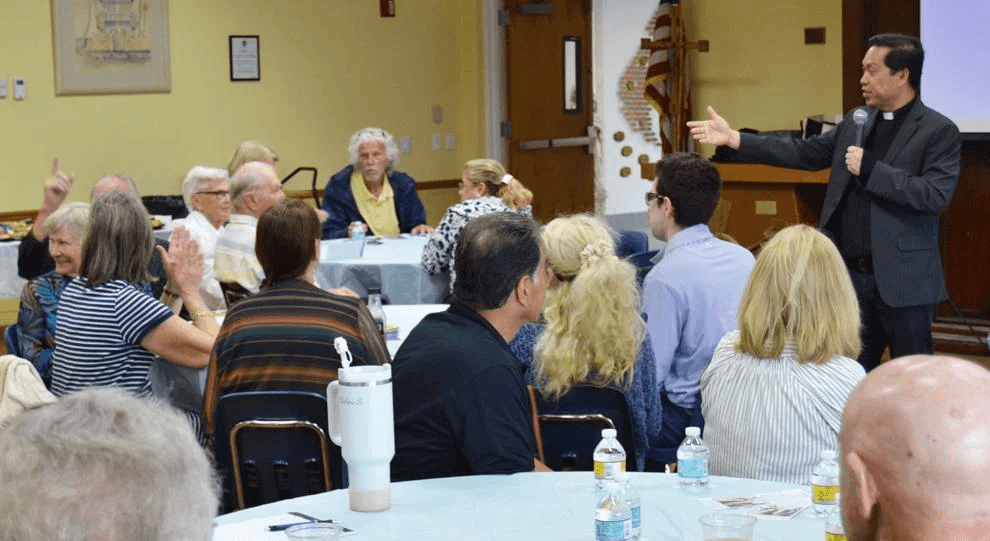
DELRAY BEACH | End-of-life care is too important an issue to delay making decisions about it, said Father Dennis Gonzales at a recent Luncheon 4 Life at St. Vincent Ferrer Parish in Delray Beach.
Luncheons 4 Life are monthly pro-life events, held at local Catholic parishes, that feature a complimentary meal for like-minded people to learn and network. The April 30 luncheon in Delray Beach featured Father Gonzales, Dr. Anthony Dardano, medical director of Delray Medical Center and vice president of the Palm Beach Physicians Guild of the Catholic Medical Association, and local nurse and Birthline/Lifeline volunteer Mary Rodriguez.
As a registered nurse working in acute, long-term and hospice care, Father Gonzales saw many difficult situations that would have been alleviated with a bit of preparation by patients and their families. Since becoming a priest in 2013 and now St. Vincent Ferrer’s pastor, Father Gonzales has undertaken a ministry to help families avoid some of the anguish that often comes with illness and death.
“My first (priestly) assignment was in Vero Beach,” he told about 60 luncheon guests. “That’s a place where there are a lot of retirees, and often in a hospital we are called to assist parishioners, patients and their family members and loved ones on end-of-life care. It was at that time that I realized maybe I will use my experience, my background, small knowledge about theology and my small knowledge about health care and assist families and those who are really struggling with end-of-life decisions.”
With his understanding of health care, bioethics and Catholic theology, Father Gonzales is still called by local hospitals to minister to families and patients. He hears from many families when their loved one is hospitalized. They ask him to pray that the person will return to good health. Some patients do rebound, he said, but many don’t get better.
“So, I started to ask a question: What is that healing all about? And I realized healing is different from cure,” Father Gonzales said. “A cure is like you bring back a person to physical wellbeing, free from illness, or at least recovery from illness, and he is discharged to his home.
“But how about if the person passes? Maybe there is no physical cure, but that person and their family members can still experience healing. And one way, my friends, that we experience healing is that we are peaceful at time of death,” he said.
Since Father Gonzales has seen so many instances where family members ended up in court over disagreements on end-of-life care, he focuses his healing ministry on teaching “the importance of having communication and conversations with your families and loved ones about your wishes.”
“Conversations, my friends, should not begin in intensive-care units or emergency rooms or at hospice facilities. It should begin in our homes where everybody has the opportunity and a calm demeanor to raise important questions and to express their desires about their health care directions,” he said.
When patients’ wishes are communicated to their loved ones and those wishes are in line with their Catholic faith, “that’s when peace comes in,” he added. A patient’s wishes are contained in a document called an advance directive that provides guidelines for how to treat that person if he or she is no longer able to make those decisions because of an illness or injury.
Advance directives generally contain three parts, Father Gonzales said. The first part is a living will, which involves withholding or withdrawing certain life-sustaining treatments or procedures. The second section is appointing someone as a health care surrogate with durable power of attorney. The third part of an advance directive involves organ donation.
Even with an extensive living will, he said, it’s impossible to plan for every contingency since medical procedures and medications may change by the time a patient is in need. “That’s why, my friends, it’s important to appoint a health care surrogate so that this person is able to direct and decide for you when you’re no longer able to decide for yourself,” Father Gonzales said.
Another issue that is pivotal for family members of people experiencing health challenges is understanding the differences between ordinary and extraordinary care. Catholic moral tradition teaches that treatment should be beneficial (ordinary) and not excessively burdensome (extraordinary).
“Identifying what’s extraordinary and what’s ordinary depends on the condition of the patient and the situation of the patient,” he said. “What’s ordinary for me may not be ordinary for another person. And what’s extraordinary for another person may be ordinary for me.”
Father Gonzales said, “When they are standard treatments and protocols and they have a record of a high rate of success, that treatment is ordinary. For example, you have high blood pressure. You take this medicine for high blood pressure. It’s standard protocol and it’s safe, with a high rate of success. That’s ordinary.”
Some patients who have tried ordinary means of treatment but haven’t been cured often choose to enter clinical trials that are experimental, he said. “Those patients, I commend them, and I say this with kindness and compassion: because of them we have these medications, we have these drugs, we have these procedures. But again, if you don’t feel like going there for clinical trials, it’s really up to you. It’s optional because that’s extraordinary means.”
Dardano, an obstetrician-gynecologist with 61 years in the medical field who has delivered more than 5,000 babies and teaches medical ethics at St. Vincent de Paul Regional Seminary, spoke about instances in which Catholic teaching has been instructive.
When he started as a physician, Dardano said most doctors were people of faith, but the field has changed. Now, more doctors and hospitals have no religious tradition to support them, and thus fewer qualms about abortion, euthanasia and sterilization.
Backing up Father Gonzales’ presentation, he said, “I like the ordinary-extraordinary means because that comes up all the time. What’s ordinary today might have been extraordinary when I was an intern, and what’s extraordinary today might be ordinary 20 years from now.
“When science progresses, our concept of ethics has to progress. Things we never even dreamed of are happening,” Dardano said.
Rodriguez, who is retired but still has an active nursing license, helped bring ultrasound machines to Birthline/Lifeline pregnancy care centers, where she has volunteered for many years. “We’ve saved a lot of babies as a result of ultrasound,” she said.
Encouraging the faithful to understand difficult and divisive topics, especially as Florida voters will consider a pro-abortion amendment in November, Rodriguez said, “I really believe that there is a need for Catholic people in general to be well educated in issues of life, so that you can all be a voice out there. You all can bring some of the details that you just heard from Father and Dr. Dardano to people who ask you because you’re very approachable, you’re out and about, you know a lot of people and you can bring a pro-life message to many.”
Anyone with questions related to end-of-life care is urged to contact their parish, read documents from the U.S. Conference of Catholic Bishops at www.usccb.org/prolife/end-life or visit the National Catholic Bioethics Center at www.ncbcenter.org, which offers a free consultation service. Information on the Florida abortion amendment is available at https://flaccb.org/abortion-amendment and www.diocesepb.org/abortion-amendment.html.

